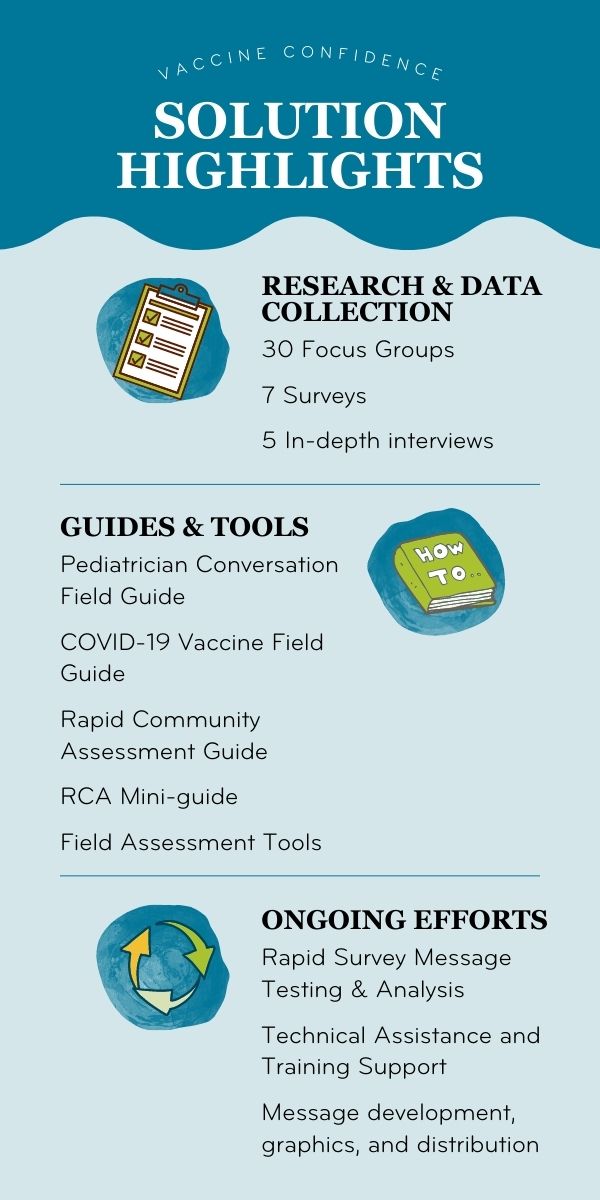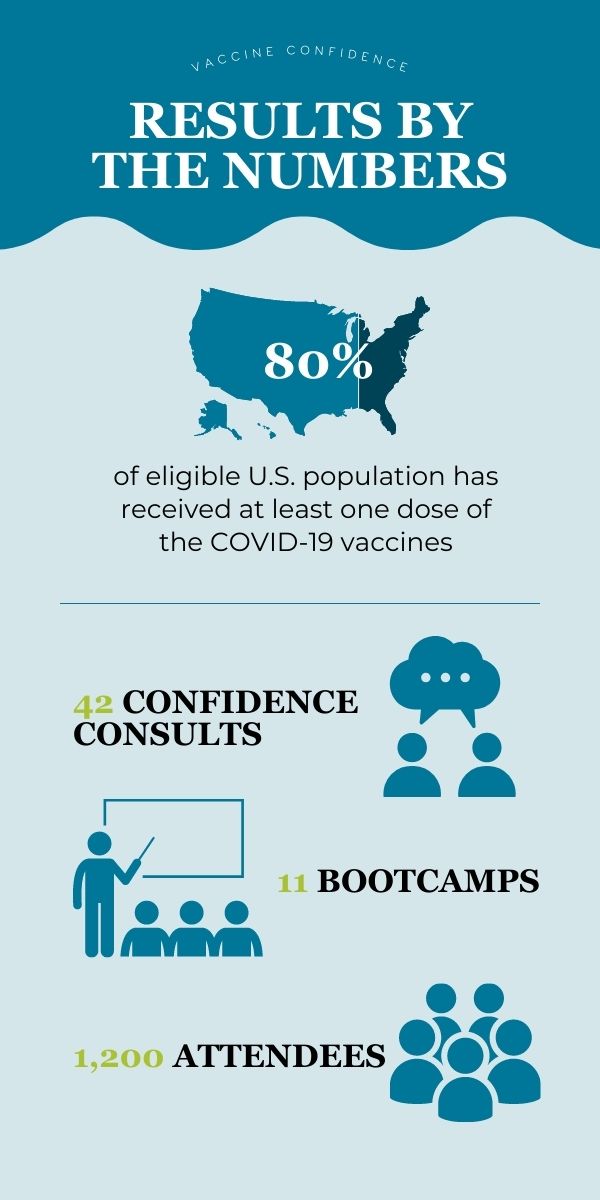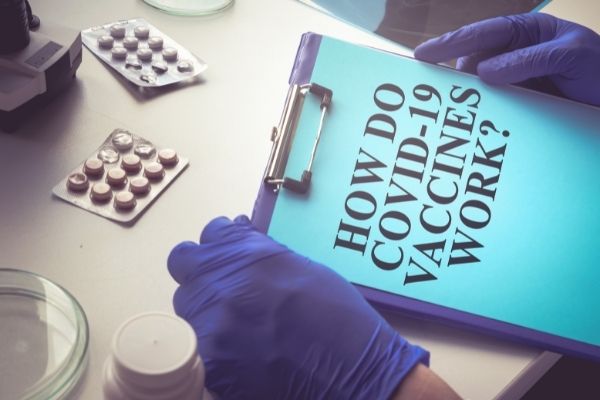Combating Misinformation and Mistrust during a Health Crisis
By Torey Repetski, Pooja Gandhi, and Roshni Devchand
Since December 2020, Karna has supported White House and Centers for Disease Control and Prevention (CDC) efforts to research vaccine hesitancy and implement strategies to increase COVID-19 vaccine confidence and uptake.

Challenge
The COVID-19 pandemic ushered in a difficult era for the public health community. As the leader of public health research and guidance in the United States, CDC was faced with responding to this rapidly evolving health crisis while also combatting an undercurrent of misinformation and mistrust circulating in the public sphere. The arrival of a vaccine against COVID-19 in late 2020 offered hope for fighting the pandemic, but political narratives, speed of development, and novel biotechnology used in the vaccine led to widespread vaccine hesitancy and slower than expected uptake. Despite these challenges, CDC and the White House set a national goal of achieving COVID-19 vaccination among 70 percent of all eligible people in the U.S. In order to reach this goal, they needed additional support from researchers skilled in health communication and behavioral science. Karna, LLC, joined these efforts in December 2020, in support of CDC’s National Center for Immunization and Respiratory Diseases and the COVID-19 Vaccine Task Force (VTF), to research factors contributing to hesitancy and develop a communication and education strategy to help increase vaccine confidence and uptake.
Strategy & Solution
A multi-faceted approach to boost vaccine confidence

Karna’s comprehensive solution utilized a full range of public health capabilities, including research, health communication, program evaluation, technical assistance (TA), and health analytics. Each area of our work informed the other areas, allowing us to provide evidence-based, data-driven recommendations, messaging, and TA. We continue to support CDC as the pandemic evolves, and the activities described below include both ongoing and completed efforts.
Research, Analytics, & Health Communications Address Broad, National Concerns
To understand and address vaccine hesitancy, Karna took a big-picture approach by developing research plans that would inform national communication efforts. Our research sought to understand the barriers and motivators to vaccination of the population at large and populations exhibiting low vaccine uptake such as Black and Latinx communities, young adults, rural residents, and parents and caregivers of school-aged children.
We conducted 30 focus groups and fielded seven surveys to inform CDC’s COVID-19 vaccine education and communication efforts. Information from focus groups provided a detailed picture of hesitancy, while surveys assessed attitudes around vaccination intent, message acceptance, and message preferences (A/B testing). Our team also performed cross-tab analyses to identify correlations across demographics and psychographic factors. We found that many vaccine concerns centered on safety, effectiveness, side effects, and messenger trustworthiness.
Karna utilized the initial research findings to develop a communication strategy and messaging focused on common concerns. To ensure that our messaging and creative concepts stayed on track, we conducted rapid survey message testing and monthly pulse-check surveys to monitor evolving data trends. With Karna’s data automation capabilities, the surveys enabled us to gather input from a large sample of the population and produce high-level findings within 48 hours. Our surveys tracked audience attitudes and demographic information, which was used to refine audience segmentation and develop effective, tailored messaging. Karna also utilized social listening strategies, including daily monitoring of news and social media platforms, to assess the current state of COVID-19 vaccine confidence and further inform messaging.
In addition to creating ongoing social media and web content, Karna developed messaging and communication tools to assist trusted partners and intermediaries with promoting vaccine confidence. Key materials include:
- A conversation guide to help pediatricians address parents’ vaccine concerns
- The COVID-19 Vaccination Field Guide that offers state and local immunization programs a behavioral science approach for addressing local COVID-19 vaccination concerns in their communities
- Messaging and toolkits about vaccine safety and misinformation for trusted messengers and social media influencers
TA, Communication, and Program Evaluation Assist with State and Local Challenges
CDC also recognized that while the comprehensive vaccine confidence research done was crucial for the development of national vaccine education efforts, some vaccine confidence and uptake challenges were more localized — specific to certain communities and populations. Rather than a “one size fits all” approach, CDC needed to build confidence through tailored strategies and trusted messengers within communities.
Thus, to offer assistance at this level, Karna helped develop the Rapid Community Assessment (RCA) guide and a TA training system. These solutions help funded partners and state, regional, and local immunization programs evaluate, diagnose, and address confidence and uptake concerns specific to their communities.
To assess the effectiveness of the RCA guide, Karna conducted a pilot program with five health departments. The evaluation involved in-depth interviews and observations of RCA training presentations. We used the findings to make improvements to the comprehensive 85-page RCA guide and its accompanying assessment tools.
Karna also supports the Prevention Research Centers’ (PRC) Vaccine Confidence Network (VCN), comprised of 26 accredited schools of public health or medicine across the U.S. With PRC-VCN members, Karna supports the evaluation of PRCs’ individual VCN behavioral interventions for increasing COVID-19 vaccine confidence and uptake as well as monitoring and evaluating the functions and impact of the VCN as a whole. This evaluation is informing future behavioral interventions for increasing vaccination and collaborative strategies for optimizing the use and dissemination of successful vaccine promotion strategies, messaging, and educational materials.
Additional TA is ongoing with CDC-funded partners and communities across the country. Our team conducts needs assessments and sets up TA sessions to discuss vaccine confidence-building strategies. Since each community faces unique challenges, we customize assistance to meet each community’s needs. Activities include:
- Confidence consultation calls with subject matter experts
- Vaccine confidence bootcamps/trainings
- Community-specific messaging and material development and distribution
- Dissemination of the COVID-19 Vaccination Field Guide
Strategy & Solution
A multi-faceted approach to boost vaccine confidence
Karna’s comprehensive solution utilized a full range of public health capabilities, including research, health communication, program evaluation, technical assistance (TA), and health analytics. Each area of our work informed the other areas, allowing us to provide evidence-based, data-driven recommendations, messaging, and TA. We continue to support CDC as the pandemic evolves, and the activities described below include both ongoing and completed efforts.
Research, Analytics, & Health Communications Address Broad, National Concerns
To understand and address vaccine hesitancy, Karna took a big-picture approach by developing research plans that would inform national communication efforts. Our research sought to understand the barriers and motivators to vaccination of the population at large and populations exhibiting low vaccine uptake such as Black and Latinx communities, young adults, rural residents, and parents and caregivers of school-aged children.
We conducted 30 focus groups and fielded seven surveys to inform CDC’s COVID-19 vaccine education and communication efforts. Information from focus groups provided a detailed picture of hesitancy, while surveys assessed attitudes around vaccination intent, message acceptance, and message preferences (A/B testing). Our team also performed cross-tab analyses to identify correlations across demographics and psychographic factors. We found that many vaccine concerns centered on safety, effectiveness, side effects, and messenger trustworthiness.
Karna utilized the initial research findings to develop a communication strategy and messaging focused on common concerns. To ensure that our messaging and creative concepts stayed on track, we conducted rapid survey message testing and monthly pulse-check surveys to monitor evolving data trends. With Karna’s data automation capabilities, the surveys enabled us to gather input from a large sample of the population and produce high-level findings within 48 hours. Our surveys tracked audience attitudes and demographic information, which was used to refine audience segmentation and develop effective, tailored messaging. Karna also utilized social listening strategies, including daily monitoring of news and social media platforms, to assess the current state of COVID-19 vaccine confidence and further inform messaging.
In addition to creating ongoing social media and web content, Karna developed messaging and communication tools to assist trusted partners and intermediaries with promoting vaccine confidence. Key materials include:
- A conversation guide to help pediatricians address parents’ vaccine concerns
- The COVID-19 Vaccination Field Guide that offers state and local immunization programs a behavioral science approach for addressing local COVID-19 vaccination concerns in their communities
- Messaging and toolkits about vaccine safety and misinformation for trusted messengers and social media influencers
TA, Communication, and Program Evaluation Assist with State and Local Challenges
CDC also recognized that while the comprehensive vaccine confidence research done was crucial for the development of national vaccine education efforts, some vaccine confidence and uptake challenges were more localized — specific to certain communities and populations. Rather than a “one size fits all” approach, CDC needed to build confidence through tailored strategies and trusted messengers within communities.
Thus, to offer assistance at this level, Karna helped develop the Rapid Community Assessment (RCA) guide and a TA training system. These solutions help funded partners and state, regional, and local immunization programs evaluate, diagnose, and address confidence and uptake concerns specific to their communities.
To assess the effectiveness of the RCA guide, Karna conducted a pilot program with five health departments. The evaluation involved in-depth interviews and observations of RCA training presentations. We used the findings to make improvements to the comprehensive 85-page RCA guide and its accompanying assessment tools.
Karna also supports the Prevention Research Centers’ (PRC) Vaccine Confidence Network (VCN), comprised of 26 accredited schools of public health or medicine across the U.S. With PRC-VCN members, Karna supports the evaluation of PRCs’ individual VCN behavioral interventions for increasing COVID-19 vaccine confidence and uptake as well as monitoring and evaluating the functions and impact of the VCN as a whole. This evaluation is informing future behavioral interventions for increasing vaccination and collaborative strategies for optimizing the use and dissemination of successful vaccine promotion strategies, messaging, and educational materials.
Additional TA is ongoing with CDC-funded partners and communities across the country. Our team conducts needs assessments and sets up TA sessions to discuss vaccine confidence-building strategies. Since each community faces unique challenges, we customize assistance to meet each community’s needs. Activities include:
- Confidence consultation calls with subject matter experts
- Vaccine confidence bootcamps/trainings
- Community-specific messaging and material development and distribution
- Dissemination of the COVID-19 Vaccination Field Guide
Results
Outcomes of our vaccine confidence efforts
As of January 2021, more than 80 percent of the eligible U.S. population has received at least one dose of the COVID-19 vaccines, and we are engaged in concentrated efforts to improve vaccine confidence in the most vulnerable communities and populations.
Our research, message development, and audience segmentation have allowed our staff to develop a variety of targeted education and communication resources and campaigns. These efforts have addressed hesitancy among young adults, pregnant people, parents of school-aged children, and people eligible for booster doses. We have also developed resources for pediatric providers to fine-tune the COVID-19 vaccine conversations they are having with parents.
To date, Karna has assisted several state and local health organizations across the nation with more than 42 confidence consults and 11 bootcamps, reaching more than 1,200 attendees who are actively working in their communities to increase vaccination. The COVID-19 Vaccination Field Guide and RCA Guide also have been made available to the public on CDC’s website, and they continue to drive requests for additional assistance.
Overall, our efforts have informed national policy, identified additional research needs, and strengthened overall vaccine communications. As the pandemic evolves and needs change, CDC continues to employ our expertise to address challenges as they arise, and we are honored to be a part of this important effort.

Results
Outcomes of our vaccine confidence results
As of January 2021, more than 80 percent of the eligible U.S. population has received at least one dose of the COVID-19 vaccines, and we are engaged in concentrated efforts to improve vaccine confidence in the most vulnerable communities and populations.
Our research, message development, and audience segmentation have allowed our staff to develop a variety of targeted education and communication resources and campaigns. These efforts have addressed hesitancy among young adults, pregnant people, parents of school-aged children, and people eligible for booster doses. We have also developed resources for pediatric providers to fine-tune the COVID-19 vaccine conversations they are having with parents.
To date, Karna has assisted several state and local health organizations across the nation with more than 42 confidence consults and 11 bootcamps, reaching more than 1,200 attendees who are actively working in their communities to increase vaccination. The COVID-19 Vaccination Field Guide and RCA Guide also have been made available to the public on CDC’s website, and they continue to drive requests for additional assistance.
Overall, our efforts have informed national policy, identified additional research needs, and strengthened overall vaccine communications. As the pandemic evolves and needs change, CDC continues to employ our expertise to address challenges as they arise, and we are honored to be a part of this important effort.


